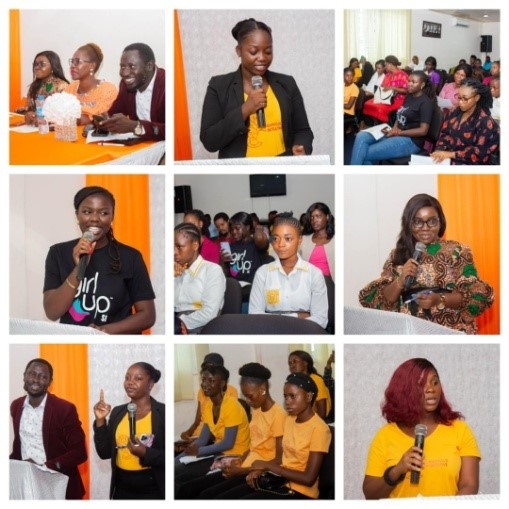By Alvin Lansana Kargbo
In a groundbreaking effort to bridge the digital divide and empower girls with vital knowledge about digital rights and online security, the Marigold Initiative has embarked on an extensive research study, generously supported by the Numun Funds. This initiative is dedicated to equipping girls with essential training and technology-focused experiences that emphasize safe internet practices.
The Marigold Initiative, in collaboration with Meraki Analytics, a distinguished research firm, conducted a meticulous baseline assessment in ten selected secondary schools in Freetown. The participating schools include the Methodist Girls High School, International School Ltd, Naiahcom High School, Annie Walsh Memorial School, Baptist Comprehensive Academy, Peninsular Secondary School, Bishop Johnson Memorial School, Freetown Secondary School for Girls, Sierra Leone Muslim Brotherhood, and Sengbeh Pieh Secondary School, focusing on girls in Senior Secondary Schools (SSS) 1 and 2.
This research endeavor took place over five working days, from February 23, 2023, to March 1, 2023, and delved into various themes related to digital rights and online security. The insights gained from this assessment will serve as the foundation for the establishment of Digital Rights School Clubs, empowering girls in Sierra Leone to navigate the digital landscape securely and confidently.
The study provides crucial insights into the digital landscape for schoolgirls in Sierra Leone. Approximately 73% of the surveyed girls have access to the internet, marking a significant step toward digital inclusion. However, a deeper analysis reveals disparities, with private schools boasting higher connectivity compared to Government schools. This digital divide underscores a significant challenge that demands targeted solutions to ensure equitable access for all.
One of the most concerning revelations from the study is the vulnerability faced by these young digital citizens. A staggering 21% of the surveyed girls reported experiencing online bullying, serving as a stark reminder of the hazards that lurk in the digital realm. Equally troubling is the fact that 46% of the girls lacked awareness of their right to online protection, emphasizing the urgency of robust digital rights education initiatives.
Another significant finding is that a quarter of the girls admitted to experiencing online regret, indicating the importance of promoting responsible online behavior. This highlights the need for fostering awareness about the potential consequences of online actions, ensuring that young girls make informed and responsible choices in their digital interactions.
The demographic breakdown of the study reveals that a significant proportion of schoolgirls fall within the 14-16 age bracket, which constitutes 59% of the surveyed population. These girls, in the early years of high school, are actively engaged with digital technologies and social media, rendering them particularly vulnerable to digital rights issues such as cyberbullying, privacy violations, and online harassment.
The 17-19 age group, comprising 38% of the respondents, forms the second largest segment. In contrast, the 11-13 and 20-22 age groups collectively constitute only 3% of the total sample. The average age of 16 years falls well within the typical age range for Senior Secondary School students in Sierra Leone. Furthermore, the median age of 16 years suggests that many of the girls interviewed were in their mid to late teenage years, a period where they are especially susceptible to online risks.
This age demographic, hovering around the adolescent years, demands heightened attention. Adolescents are at a critical developmental stage, navigating the complexities of both physical and digital worlds. Their active engagement with digital platforms, coupled with their burgeoning independence, necessitates a comprehensive understanding of their digital rights and the potential threats they might encounter online. Cyberbullying and harassment, prevalent issues in this age group, make it imperative to equip them with knowledge and skills to protect themselves effectively.
Based on these nuanced findings, the study offers strategic recommendations aimed at bridging existing gaps and creating a safer digital future for school girls in Sierra Leone.
One of the most striking findings is the overwhelming enthusiasm for digital clubs, with an impressive 97% of schoolgirls expressing their interest in participating. These clubs are recognized as potent tools for empowerment, fostering awareness, and imparting essential skills for secure digital navigation.
The study also recommends prioritizing schools with limited resources for safe online navigation. Methodist Girls High School, International School Ltd, Naiahcom High School, Annie Walsh Memorial School, and Baptist Comprehensive Academy have been identified as key focal points for club implementation.
Furthermore, the study highlights the critical need for digital rights training in all schools. Urgent attention must be directed to schools where training is acutely required, notably Peninsular Secondary School, International School Ltd, Baptist Comprehensive Academy, Methodist Girls High School, and Bishop Johnson Memorial School.
In conclusion, the Marigold Initiative, in collaboration with Meraki Analytics, is spearheading an essential endeavor to empower girls with digital rights knowledge and online security. The findings of this comprehensive research study serve as a clarion call for action, highlighting both the progress made and the challenges that persist in the digital landscape for school girls in Sierra Leone. This initiative’s strategic recommendations offer a pathway to ensure that every girl in the country has the knowledge and resources to navigate the digital world safely and confidently, breaking down barriers and promoting digital inclusion.




